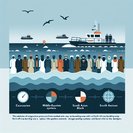
A comprehensive "Guide to Digital Nomad Visas in Europe (2025 Edition)", published on 5 November by ExchangeRates.org, crowns Spain’s international teleworking visa as the continent’s stand-out option for remote workers. The article highlights Spain’s one-year consular visa followed by a three-year, renewable residence permit—one of the longest initial durations available—plus access to the Beckham-style 24 % flat-tax regime.
Key eligibility points reiterated in the guide include proof of a university degree or three years’ professional experience, a three-month pre-existing employment relationship with a non-Spanish employer and private health insurance. While the law sets no fixed salary floor, most consulates look for income around double the Spanish minimum wage (€2,000-€2,100 net per month), though practitioners advise budgeting higher after the January 2025 minimum-wage increase.
![Spain’s digital-nomad visa tops new European guide as remote-worker favourite]()
Why this matters for HR: the digital-nomad visa has quickly become a gateway for tech and creative talent that companies wish to base temporarily in Spain without triggering local payroll. Dependants can be included, and spouses may work up to 20 % for Spanish entities—useful for dual-career families. The guide also warns of appointment bottlenecks in high-volume consulates (London, New York) and recommends applying at least 12 weeks ahead.
With Portugal tightening income thresholds and Greece introducing territorial-tax rules, Spain’s relative affordability and lifestyle continue to appeal. Municipalities from Valencia to Málaga have launched co-living incentives, and rural regions such as Extremadura’s Ambroz Valley now offer cash grants for digital nomads willing to settle for two years. Mobility teams should, however, brief assignees on Spain’s requirement to swap the visa for a residence card within 30 days of arrival—a step often overlooked.
The guide’s prominence is expected to drive another spike in applications ahead of the 2026 peak travel season, adding pressure to consular and police-station appointment systems.
Key eligibility points reiterated in the guide include proof of a university degree or three years’ professional experience, a three-month pre-existing employment relationship with a non-Spanish employer and private health insurance. While the law sets no fixed salary floor, most consulates look for income around double the Spanish minimum wage (€2,000-€2,100 net per month), though practitioners advise budgeting higher after the January 2025 minimum-wage increase.

Why this matters for HR: the digital-nomad visa has quickly become a gateway for tech and creative talent that companies wish to base temporarily in Spain without triggering local payroll. Dependants can be included, and spouses may work up to 20 % for Spanish entities—useful for dual-career families. The guide also warns of appointment bottlenecks in high-volume consulates (London, New York) and recommends applying at least 12 weeks ahead.
With Portugal tightening income thresholds and Greece introducing territorial-tax rules, Spain’s relative affordability and lifestyle continue to appeal. Municipalities from Valencia to Málaga have launched co-living incentives, and rural regions such as Extremadura’s Ambroz Valley now offer cash grants for digital nomads willing to settle for two years. Mobility teams should, however, brief assignees on Spain’s requirement to swap the visa for a residence card within 30 days of arrival—a step often overlooked.
The guide’s prominence is expected to drive another spike in applications ahead of the 2026 peak travel season, adding pressure to consular and police-station appointment systems.










